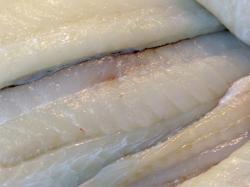Tests Reveal Mislabeling Of Fish
May 31, 2011 | 1 min to read

Scientists aiming their gene sequencers at commercial seafood are discovering rampant labeling fraud in supermarket coolers and restaurant tables: cheap fish is often substituted for expensive fillets, and overfished species are passed off as fish whose numbers are plentiful.
Scientists aiming their gene sequencers at commercial seafood are discovering rampant labeling fraud in supermarket coolers and restaurant tables: cheap fish is often substituted for expensive fillets, and overfished species are passed off as fish whose numbers are plentiful.
Yellowtail stands in for mahi-mahi. Nile perch is labeled as shark, and tilapia may be the Meryl Streep of seafood, capable of playing almost any role.
Recent studies by researchers in North America and Europe harnessing the new techniques have consistently found that 20 to 25 percent of the seafood products they check are fraudulently identified, fish geneticists say.
To read the rest of the story, please go to: The New York Times
